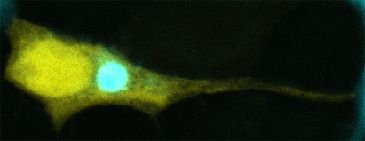
Our research
A tight balance between the synthesis of new proteins and recycling of old and damaged proteins is critical to keep cells healthy. Disturbances in protein homeostasis (i.e. ”proteostasis”) can result in accumulation of dysfunctional proteins that clump together forming protein aggregates that are toxic for cells.
Accumulation of protein aggregates lies at the core of a number of neurodegenerative diseases, such as Alzheimer’s, Parkinson’s and Huntington’s disease. Neurons, like all cells, are equipped with an efficient system for intercepting abnormal, dysfunctional and misfolded proteins and targeting them for recycling: the ubiquitin-proteasome system. The question remains why the ubiquitin-proteasome system fails to efficiently recycle misfolded proteins in these diseases and, more importantly, if it is possible to therapeutically stimulate its activity thereby boosting recycling of misfolded proteins. These are important questions that we study in our group using advanced in-house developed tools and cell biology methods.
Cancer cells, on the other hand, are heavily relying on the ubiquitin-proteasome system to deal with the large number of dysfunctional proteins that they produce. Consequently, they are more sensitive than healthy cells to drugs that partially block the ubiquitin-proteasome system. This is already used in the clinic and several types of proteasome inhibitors have been introduced for the treatment of cancer, in particular multiple myeloma and mantle cell lymphoma. Using our unique tools, we are identifying and characterizing new compounds that can inhibit the ubiquitin-proteasome system and kill cancer cells.
Finally, the ubiquitin-proteasome system, instead of being a target itself, can also be used as a tool in therapeutics. Small molecules have been developed that instruct the ubiquitin-proteasome system to eliminate disease-causing proteins. This concept of “Targeted Protein Degradation” allows to destroy and inhibit almost any protein, including proteins that were considered undruggable.
We are studying the ubiquitin-proteasome system in health and disease. Our overarching aim is to better understand conditions that affect its functionality as well as investigate possibilities to therapeutically target or exploit the ubiquitin-proteasome system in neurodegenerative diseases and cancer.

